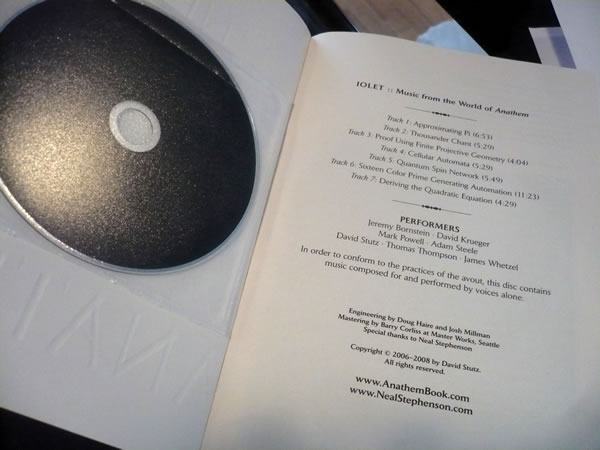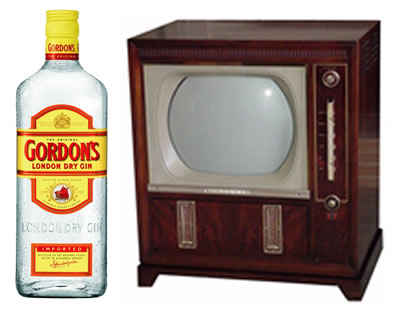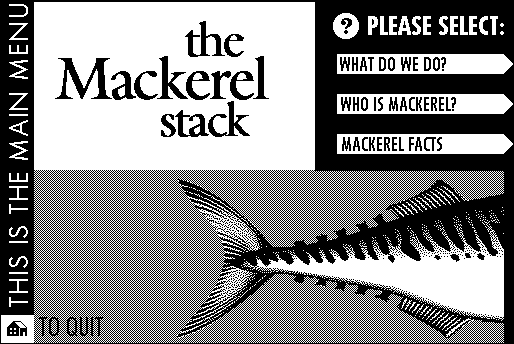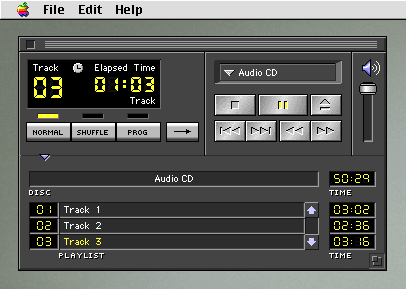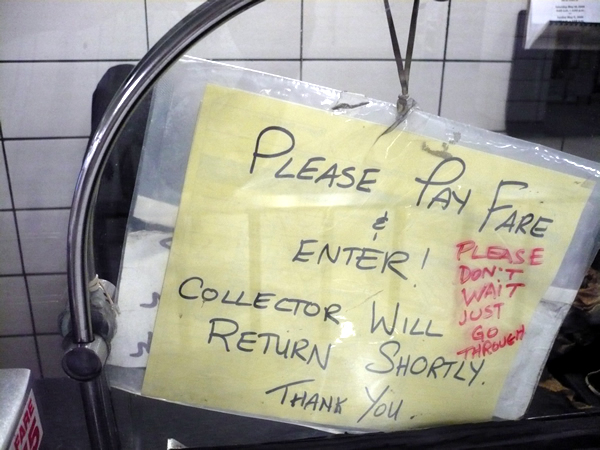[This article also appears in my tech blog, Global Nerdy.]
Introduction

Hello. My name is Joey deVilla, and I am unemployed.
Hmmm. Let’s try that again.
Hello. My name is Joey deVilla, and I am between jobs.
That has a much better ring to it. An optimistic, “this too shall pass” kind of vibe. Maybe the third time will be the charm.
Hello, My name is Joey deVilla, and today is Day One of a new chapter in my career.
There we go.
The Credit Crunch and the Job Market
Many people are in the same situation.
Even if you take only my industry — the software and web industry — into account, a lot of people are feeling the same pain. The unemployment rate in our hub, Silicon Valley, has gone up for the fourth consecutive month and hit 6.6%, its highest level in four years. People who follow the industry are writing articles warning us that it’s not if you’ll get laid off, but when. Even Robert Scoble, who’s probably one of the most sunny and optimistic tech bloggers out there has recently written articles with titles like Surviving the 2008 Recession and What to Do if You’re Laid Off in the 2008 Recession.

The “Bailout Protest” march on Wall Street.
It’s bad all ’round. As I write this, a Google News search for the term “financial crisis” yields just shy of 200,000 results. There are articles with titles like:
- The Next Decade Could be Our Very Own Great Depression
- Financial Turbulence: Pass the Airsick bags
- Credit Crunch Banker Leaps to His Death in Front of Express Train
- Anger, fear and deadlock, then President Bush sums it up: ‘This sucker could go down’
- In Financial Crisis, Metaphors Fly Like Bad Analogies
When the news is filled with talk of credit crunches, bank bailouts and poorly-thought-out metaphors, you can be certain that every business is adjusting their plans to ensure that it doesn’t go under. Cutting spending is one of the most important of these adjustments, and since employee salaries are expenses, companies are laying off the employees they believe they can do without and slowing down (if not stopping) their hiring.
This is not a good time to look for a job nor lose one.
What to Do?
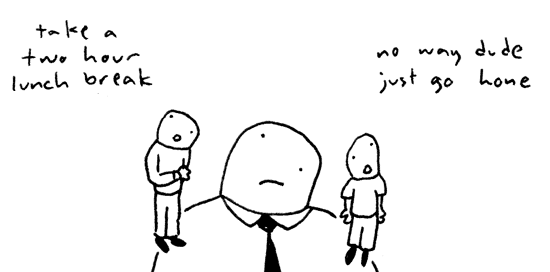
Losing your job is a shaming, stress-inducing, heart-rending, and even frightening experience at the best of times. Losing your job at the start of what some people in the media are calling the New Great Depression is far worse, even if you think they’re exaggerating for effect.
In the time since I posted the article in which I announced that I had been let go, I’ve received about a dozen emails from people who’ve said that they’re in the same situation. They have no idea what to do and asked me what I was doing and if I had any advice.
I have some observations and suggestions, some of it from my layoff experience back in 2002 and some of it from the past few days’ experiences, and I’ve written them below.
You Will Know When You’re Called in for “The Meeting”
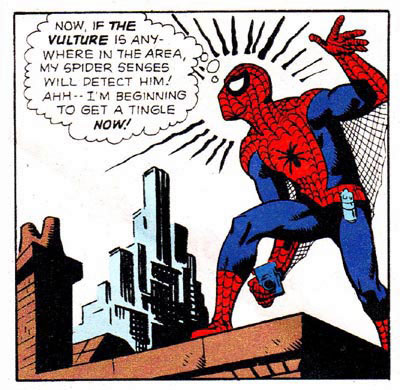
I knew I was being brought in for the “your services are no longer required” meeting the moment I was invited to it.
Many people dismiss intuition, but in experience, I have found that a well-trained intuitive sense will often serve you well in those situations where the situation is murky or when rationality is following the wrong path. I susbscribe to the theory that intiuition is your brain doing some massively parallel processing, subconsciously “filling in the missing pieces” when you are presented with incomplete information. That’s why Poincare said “It is through science that we prove, but through intuition that we discover.”
It might have been something in the Director of Tech’s voice or his body language. Perhaps it was that there’d been little for me to do in the past little while because of the overlap between our jobs. Maybe the fact that the meeting had been called up out of the blue with no explanation as to what it was about was the tip-off. All these hints would be clear to a detached observer, but to someone right in the middle of the situation, they might not be so apparent. Thanks (or no thanks, perhaps?) to a flash of intuition, I had a pretty good idea of what I was in for.
A quick aside: I believe that intuition is not independent of learning and experience, but enhanced by it. When intuition “fills in the missing pieces”, it has to get those pieces from somewhere. Without learning, and even more importantly, the regular application of that learning, intuition is no better than flipping a coin.
You Have Moments to Get a Grip
Armed with that intuitive flash, I had the twenty or so seconds’ travel time between my desk and the meeting room to collect myself. At this point, I only had a vague sense that this was my termination meeting; intuition isn’t a straight-forward thing like a warning light on your car’s dashboard or a pop-up window on your computer:
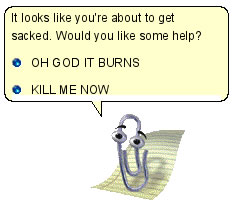
“Clippy” dialog created using imageGenerator.net’s Clippy Image Generator.
Do whatever it takes to steel yourself for the bad news. Whether it’s deep breathing, couting to ten, reciting your own personal mantra or firing up your “poker face”, you want to get ready to conduct yourself at the meeting with as much grace, aplomb and professionalism as you can muster.
The Second Most Important Meeting You Might Ever Have with Your Employer
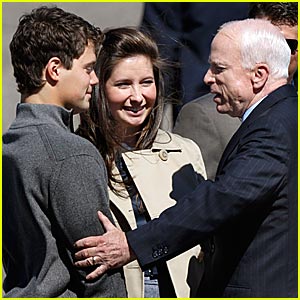
I’ll admit that my termination meeting wasn’t as uncomfortable as this one.
(In case you were wondering, the most important one is the job interview.)
I used to work as a DJ at a popular campus pub at Crazy Go Nuts University. Both the atmosphere and the vantage point offered by the DJ booth gave me the opportunities to witness many breakups from a detached third-party point of view, whether I want to see them or not. Even at their best, breakups are pretty rough; when they get ugly, you can’t help but feel shame for the couple.
No matter what you’re feeling at the meeting, you want your termination to be as good a breakup as possible. This means that you must handle the meeting professionally. The way you behave at this meeting will set the tone for your termination. If it is full of freak-outs and acrimony, they won’t be inclined to do you any favors. On the other hand, if you conduct yourself in a professional manner, you may gain some goodies such as extra negotiating leverage and a willingness on their part to do what they can for you.
If you can remember these questions through the stress of the meeting, you should ask questions like:
- When is my last day?
- What is my severance package?
- How long will my company insurance coverage last?
- When do I have to return the company laptop and Blackberry?
- How long do I have to collect my stuff from the office?
- What do you want me to do with my current projects and files?
- Can I get a letter of recommendation and use you as a reference? (Naturally, if you’re being fired rather than laid off, don’t bother asking this question.)
Don’t worry about memorizing these questions — just remember that you should leave the meeting with a clear idea of what they expect from you and what you can expect from them.
If they’ve given you papers to sign, do not sign them yet. Ask for some time to “look them over”.
Take a Walk as Soon as Possible

This is going to sound terribly touchy-feely new-agey, but I’m going to say it because it’s an important step: at your first opportunity, take a break, get out of the office and go for a walk.
When this first opportunity comes depends on the sort of place where you were and the conditions under which you’re being let go. In some cases, you’ll be asked to pack your things and leave immediately, sometimes with a minder assigned to you so that you don’t go pilfering office supplies. In my case, I was asked to say on for a few days to be debriefed and help with the transfer of responsibilities.
Since I was at the office for a few more days and since it was the sort of place where they’re pretty cool about going out for a break, I went for that walk at the first opportunity. (Besides, what were they going to do, fire me?)
The walk is important because it gets you away from the office and to clear your head. Regular readers of this blog know that I’m usually an easy-going, “go with the flow” kind of guy who’s seen and done some pretty crazy things, and even I needed that walk. I felt twitchy and drained at the same time.
The walk gives you a chance to come down from one of the most stressful experiences you’ll ever face in your working life and come to terms with what’s happened. It is not the time for figuring out what your immediate next steps are; it is the time to collect yourself for figuring out what your next steps are.
Don’t do the walk in a fugue state. Take note of your surroundings. Chances are you’ll see things that you passed by every day but never noticed before. This is good, because it’s preparation for what you’re going to be doing for the next little while: seeing things differently.
Deal with the Shame
No matter how good a job your were doing or how well you served the company, being let go will make you feel like thie cat pictured below:
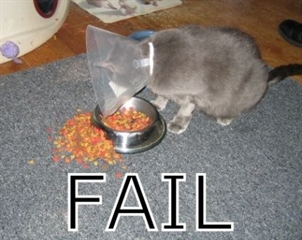
It will feel as if you had been weighed in the balance and found wanting. In fact, that’s what probably happened. Perhaps you weren’t found wanting as a person or an employee, but when the bean-counters did the books, either you went or the company did.
Thanks to evolution, being let go feels terrible. It feels like getting dumped, which feels terrible because it means that you are failing your biological imperative to keep the species going. Without this feeling, we don’t have the drive to reproduce and thrive, and it’s “goodbye species”.
You deal with the shame, using whatever constructive coping mechanisms work best for you. In my case, I hit the gym, did a little writing, played a little music on the ol’ squeezebox and got involved in some very severe rocket-launcher-assisted altercations in Grand Theft Auto IV.
If you must, have a drink or two but don’t go beyond that. You want to take the edge off, not go on a binge.
You Must Come to this Realization
Crank up your computer’s speakers and enjoy the video below. It’s the Soup Dragons’ 1990 cover of the Rolling Stones’ I’m Free. Don’t be afraid to shake your booty if you feel the urge:
If you need to, play the video a couple of times just to make sure the song’s point soaks in: you’re free.
Once the initial shock of losing your job has worn off, consider this: the future has suddenly become a blank slate. That may sound scary, but you should think of it as liberating.
Think about it. That end-of-the-week progress report that management expects? Not your problem anymore! Getting a response from that contractor for the 50-page spec for that increasingly complicated e-commerce website that you’re responsible for? Somebody else has to deal with it now! Hunting down the bug in the credit card payment gateway? Rubbing an irate client’s belly? Putting new covers on the TPS reports? You’re free of all those responsibilities.
All the day-to-day stuff that you’ve been doing at work has just vanished. This frees you to stop worrying about the doing things for the company and start doing things for you. Without those things taking up your time and thoughts, both your calendar and your mind are free to concentrate on “You, Incorporated”.
In the Next Installment
The next steps, including what you can do with all that spare time.





